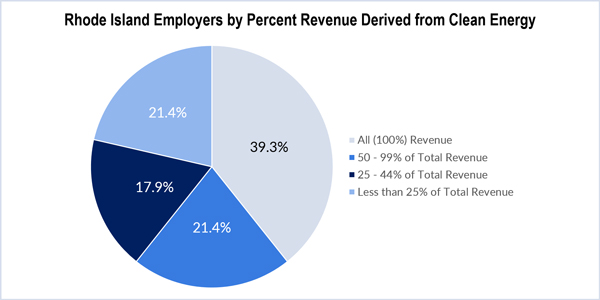By Michael Kuser
Rhode Island is seeking ways to sustain a recent surge in jobs stemming from the growth of renewable and distributed energy resources.
Clean energy jobs in the Ocean State have increased by 66% since 2014, with more than 15,300 people now working in the sector, according to a recent report from the state’s Office of Energy Resources (OER). Solar employment alone has grown 16% during the past 12 months. Energy efficiency currently represents the largest portion of the clean energy sector, with almost 9,000 workers across the state.
In 2014, the state’s legislature established the Renewable Energy Growth (REG) program to promote installation of grid-connected renewables and encourage growth of DERs (Act H 7727). Supervised by the Rhode Island Public Utilities Commission, the REG program is forecast to account for 160 MW of renewable energy development — valued at $390 million — by its 2019 end date.
But OER’s 2017 Clean Energy Industry report revealed that the small firms that dominate the distributed generation market are having trouble hiring qualified workers, in part because of the state’s high cost of living, competition and the relatively small number of available college graduates.
State officials are working to improve the sector’s labor situation. The OER is developing a program to provide funding for clean industry interns and another initiative offering free college tuition for state residents. Gov. Gina Raimondo has proposed the Rhode Island Promise Scholarship, which would include two years of free college at the state community college, but funding is contingent on the fiscal year 2018 budget, which has not been enacted.
Because most of clean energy employment is in installation, some initiatives will be aimed at vocational schools and high schools.
‘Real Jobs’
The Real Jobs RI program, for example, brings employers and educators together to design training courses that focus on the skills needed by the industry.
Carol Grant, head of OER, told RTO Insider about several grants her office is seeking under the program. One focuses on fuel delivery and the other works with the University of Rhode Island to enhance its existing fellowship program.
In partnership with the solar PV industry, OER also applied to the Department of Labor and Training for a grant to increase the pipeline of electricians skilled in PV technology and increasing the number of certified salespeople.
Other policy initiatives will facilitate ties between the marine research and development centers at URI and the Newport Naval Base. The OER is already working with the U.S. Navy on clean energy issues.
Other Administrative Efforts
The OER also is supporting legislation that would:
- Simplify electrical and building permits by establishing one statewide solar permit application process beginning in 2018.
- Extend and expand the REG program, which helps homeowners, businesses, farmers and municipalities pursue renewable energy projects.
- Continue the state’s electric vehicle rebate program, which helps reduce costs for residents purchasing EVs.
A separate Brattle Group report commissioned by the OER said the REG program will add close to 500 new jobs to the economy annually from 2016 to 2019 because of construction but provide nearly no net gains between 2020 and 2040. The report notes that “while operations and maintenance jobs grow, they are offset by losses in service jobs resulting from modestly higher electricity prices until late in the period.”






